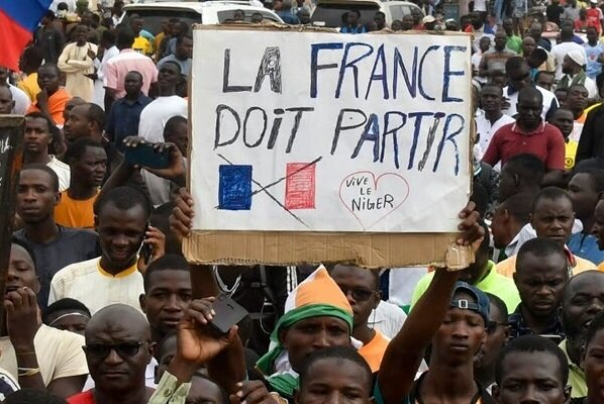In the wake of the seizure of power by General Abdourahamane Tchiani’s army in Niger on July 26th, a significant escalation in tensions has emerged between Niamey and its former colonial ruler, Paris. This situation has now reached a point where France is seriously contemplating the idea of invading the West African nation.
By Salah Uddin Shoaib Choudhury
French President Emmanuel Macron has vehemently stated that any assault on French citizens, diplomats, the army, or French bases will result in swift retaliation from France. This stern warning reflects the gravity of the situation.
However, the prospect of a French invasion of Niger carries with it the potential for a full-scale Franco-African conflict. Historically, several former French colonies have been sources of substantial resource extraction. Given France’s current challenges, these resources could be of greater importance than ever before.
The newly established government in Niger has made it clear that any aggression or attempted aggression against the state will be met with immediate response. The government emphasized that this threat is not aimed at friendly countries like Burkina Faso and Mali, which are also under military insurgent rule. In a joint statement, Burkina Faso and Mali warned that any military intervention against Niger would be tantamount to a declaration of war.
As tensions mount, the military government of Niger has terminated various defense agreements with France, including those related to the presence of French troops in Niger and the status of military personnel engaged in counter-jihadist efforts.
Recent geopolitical shifts in the region have left France with limited options. Its military involvement in Chad ended in defeat, and its bases in Côte d’Ivoire, Senegal, and Gabon lack the necessary troop numbers to serve as viable staging grounds for an invasion.
West African leaders have issued a threat to intervene militarily if the military takeover in Niger is not reversed within a week. France has warned of immediate retaliation, while Spain has suspended bilateral cooperation following protests by pro-coup individuals outside the French embassy.
France faces a strategic dilemma. If it allows Niger to pursue true independence, it risks losing access to the country’s valuable natural resources. Many of its former colonies have long been sources of resource extraction, and these resources have gained heightened importance for France in light of its current challenges.
President Mohamed Bazoum, who came to power through a nonviolent transfer of authority two years ago, is currently held in the Presidential Palace. General Abdourahamane Tchiani has declared himself the new national leader. The international community has widely condemned the coup, with France, in particular, having economic interests and military presence in Niger due to its uranium resources.
The Economic Community of West African States (ECOWAS) has outlined a plan for a potential intervention against the junta that has taken control in Niger. However, ECOWAS’ mission to reinstate Bazoum and the junta’s withdrawal from military cooperation agreements with France have deepened the crisis in a region grappling with strong jihadist groups.
France faces challenges in maintaining its military presence and interests in Niger. The situation prompts considerations about the country’s neo-colonial relationships and the sustainability of its interventions in the region. The complexity of the situation is further compounded by the involvement of Algeria, a regional power that opposes Western influence.
In the midst of these tensions, concerns have arisen in Europe regarding uranium exports from Africa, given Niger’s significant production of this resource. France’s engagement in uranium mining through companies like Orano has positioned it as a major player in this sector. Despite potential disruptions, French and European authorities downplay immediate impacts on uranium needs.
The situation between France and Niger is marked by escalating tensions and strategic complexities. The potential consequences of a French invasion, the importance of resources, and geopolitical shifts in the region all contribute to a precarious landscape that requires careful consideration and international cooperation to navigate.
Salah Uddin Shoaib Choudhury is an internationally acclaimed multi-award-winning anti-militancy journalist, writer, research-scholar, and Editor, Blitz, a newspaper publishing from Bangladesh since 2003. He regularly writes for local and international newspapers. Follow him on X @Salah_Shoaib






